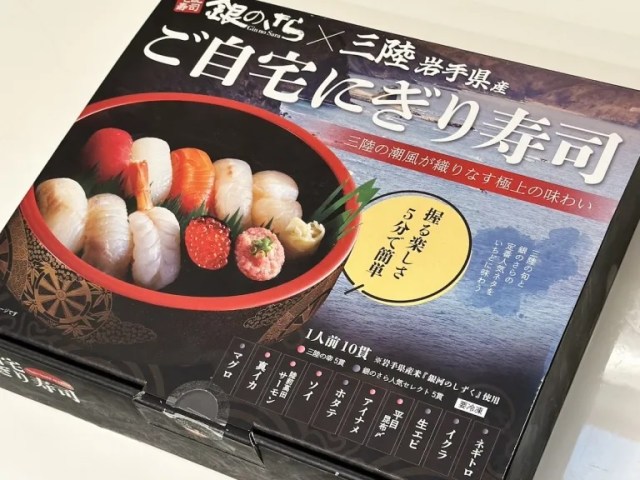
Gin no Sara teams up with regional fishery company to give you everything you need to make your own sushi, but how does it taste?
Gin no Sara is Japan’s most popular sushi delivery company. “Sushi delivery company? So, it’s a sushi restaurant chain that also delivers takeout, right?” you might be asking, but Gin no Sara doesn’t have any eat-in spaces, and their generally out-of-the-way locations make them inconvenient for carryout orders, so pretty much all customers have Gin no Sara deliver their sushi to them.
However, Gin no Sara’s latest sushi offering isn’t something you can dig into as soon as its at your door, because it’s a frozen assemble-it-yourself sushi kit, with everything you need to put together an assortment of nigiri and gunkan pieces.
Called the “At-Home Nigiri Sushi” set, the kit is a joint project between Gin no Sara and Iwate Prefecture’s Sanriku Fisheries. Open up the box, and inside you’ll find 10 pre-formed blocks of vinegared sushi rice, five slices of frozen fish from Gin no Sara’s regular suppliers, and five frozen Iwate-sourced seafood selections from Sanriku.
▼ The Gin no Sara selection consists of tuna, scallop, shrimp, ikura (salmon roe), and negitoro (minced tuna with green onion), while the Iwate assortment is made up of salmon, squid, jacopever, greenling, and flounder with kelp.
Since the fish and rice come frozen, the first step is to defrost them. Following the illustrated instructions that come with the kit, we placed the seafood under running water, which had it thawed in a few minutes.
The rice, on the other hand, has to be thawed in the microwave, after poking a few holes in the container’s covering sheet.
Next, it’s time to assemble the sushi. Included in the kit are a pair of gloves to wear while you’re doing the work, plus nori (dried seaweed), wasabi, and soy sauce.
After applying a dab of wasabi on each block of rice, we started adding the slices of fish. This actually takes a more deft touch than we’d expected. Simply lay the fish on top, and it’ll slide off. Press it down to firmly, though, and you’ll squish the rice block and mangle the fish.
As we handled the fish, we noticed to our pleasant surprise that although it was now thawed, none of the flavorful juices of the seafood itself were dripping out.
Assembling the gunkan pieces comes with an additional challenge, as you’ve got to wrap them around the sides with nori to create their battleship-like base. Excessive fiddling with the seaweed can cause it to tear or crumble, so you’ll want to take a deep breath, then try to compete the wrap as smoothly and swiftly as you can.
▼ A spoon is handy for adding the ikura and negitoro with.
And then, once we’d assembled our tenth piece, it was time to eat!
Taste-testing duties fell to our Japanese-language reporter Saya Togashi, who started with the salmon, but even before taking a single bite she was impressed by its beautiful vibrant color.
And it tasted just as good as it looked! In fact, all of the seafood was immensely satisfying, rich in flavor with just the right amount of appetite-stimulating firmness. The cuts of fish were nice and thick, and large enough to wrap over the top corners of the rice blocks.
In addition, Saya was completely blown away by the quality of the rice. Saya is particularly particular when it comes to Japan’s representative grain. She finds frozen rice, whether its frozen rice balls bought at the supermarket or frozen leftovers of rice she’s cooked herself, completely unappealing, and she’s not crazy about microwavable rice packs either. And yet, the microwaved-from-frozen rice in the Gin no Sara kit was outstanding, with none of the lumpy texture or freezer-burn flavor she associates with frozen rice.
So it’s a win all around in terms of flavor, and Saya thinks this would be a great thing for sushi fans to keep stashed in their freezer for those sudden sushi cravings that inevitably visit Japanese cuisine foodies.
Oddly enough, you can’t buy the Gin no Sara At-Home Nigiri Sushi set through the regular Gin no Sara order system. Instead, it’s offered at select michi no eki (local roadside souvenir shops), and in downtown Tokyo at the Iwate Ginga Plaza regional products specialty shop in the Ginza neighborhood, with a suggested price of 2,680 yen (US$17.85). It’s also available for order online through Rakuten here, though at slightly higher prices, depending on how many kits you order (which sounds to us like a good excuse to buy more sushi).
Photos ©SoraNews24
● Want to hear about SoraNews24’s latest articles as soon as they’re published? Follow us on Facebook and Twitter!
[ Read in Japanese ]

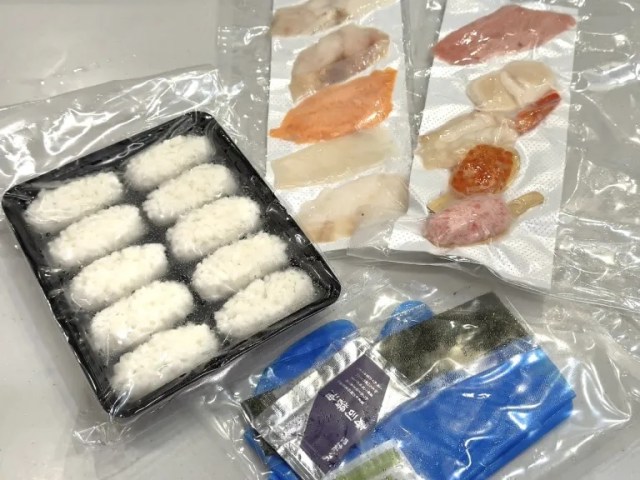
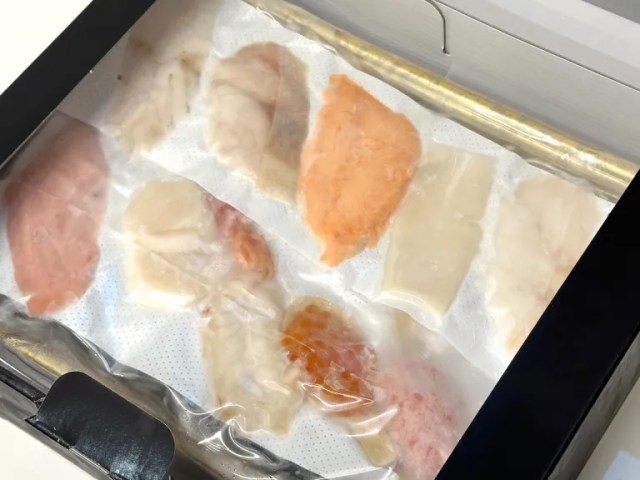
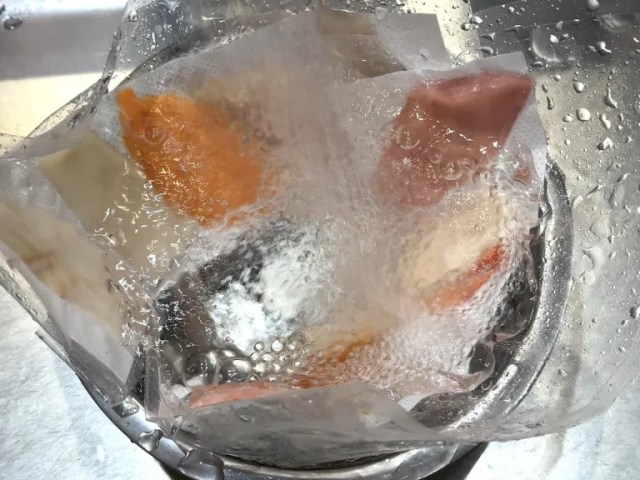
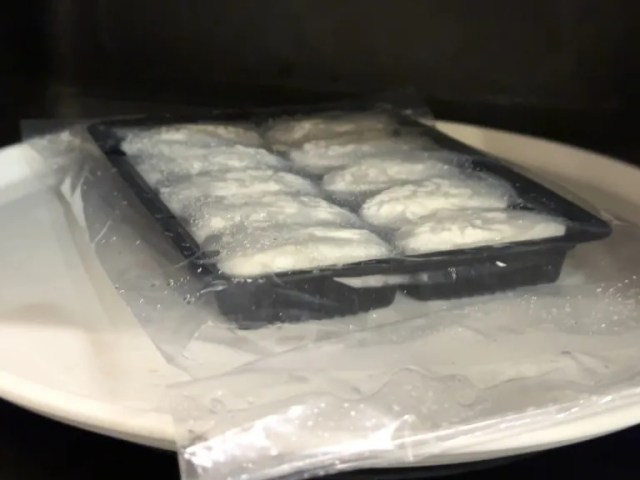
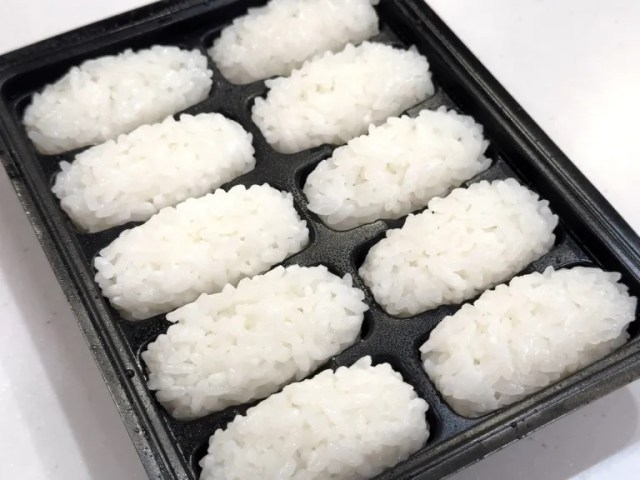
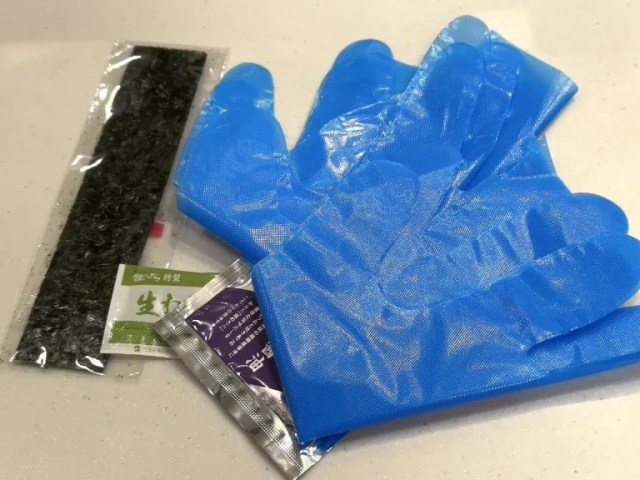
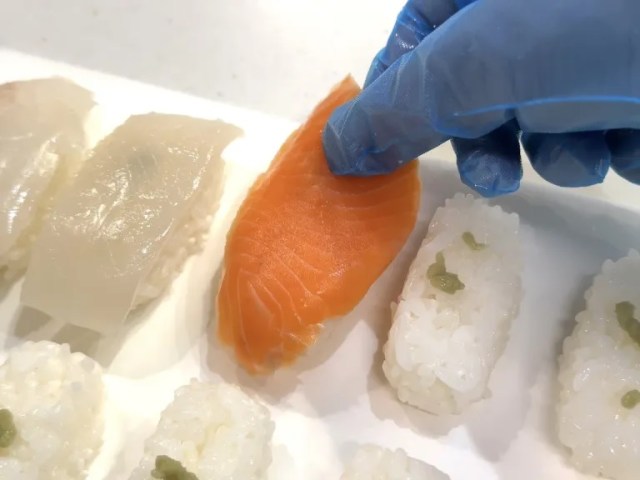
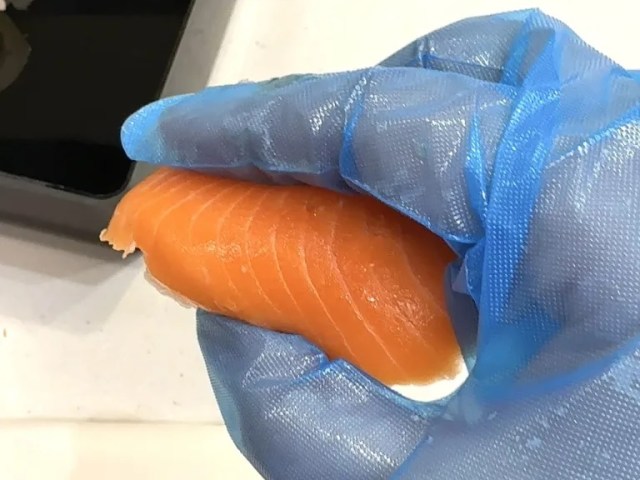
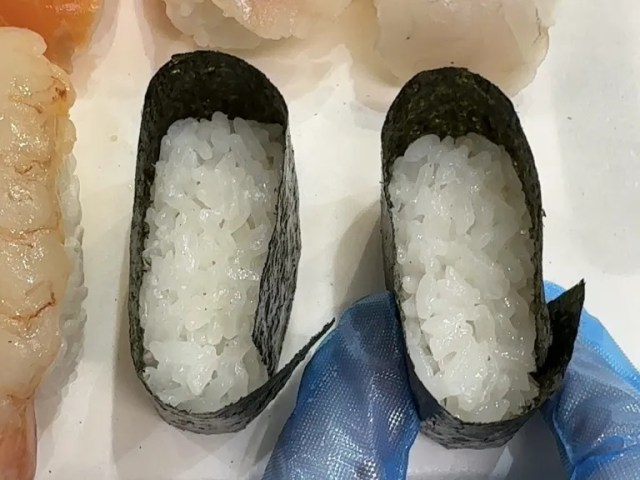
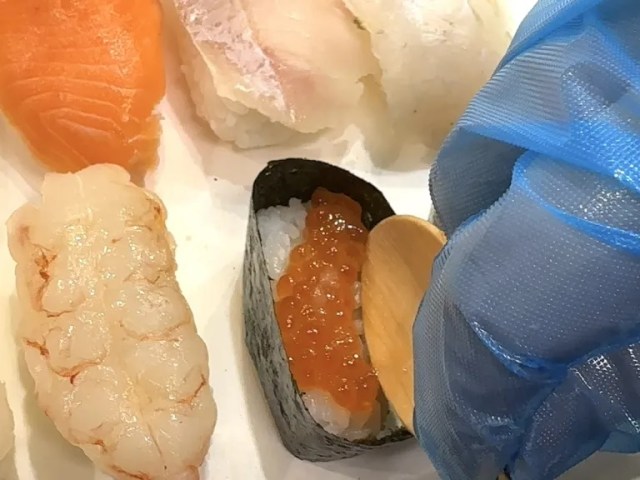
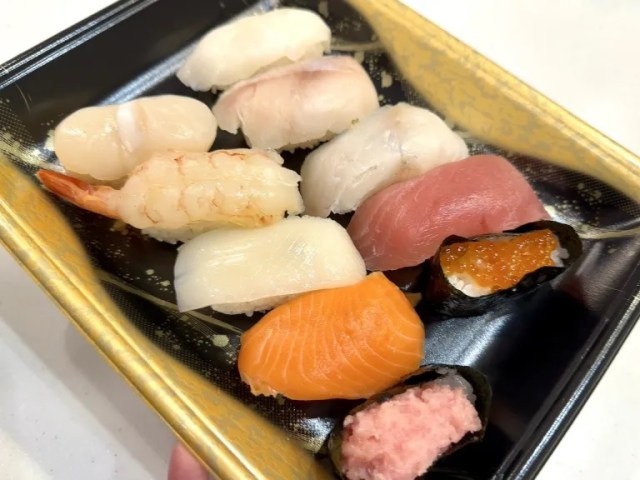
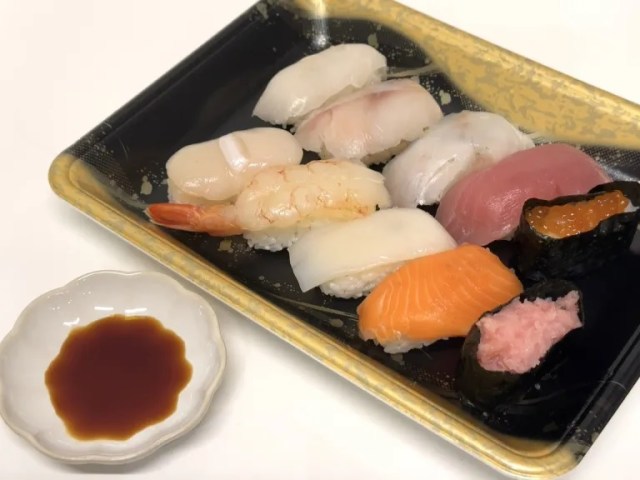
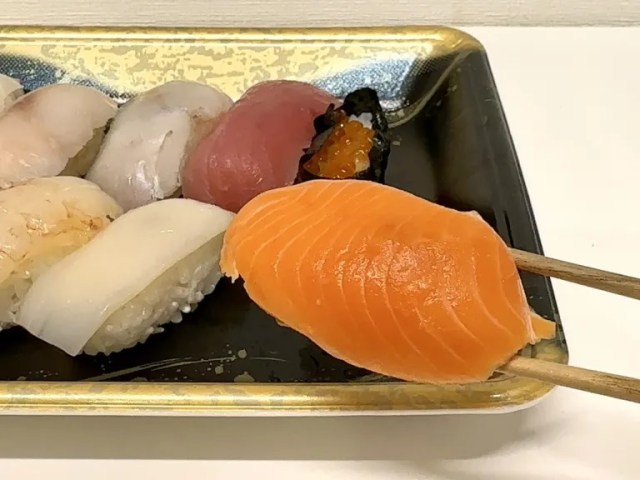
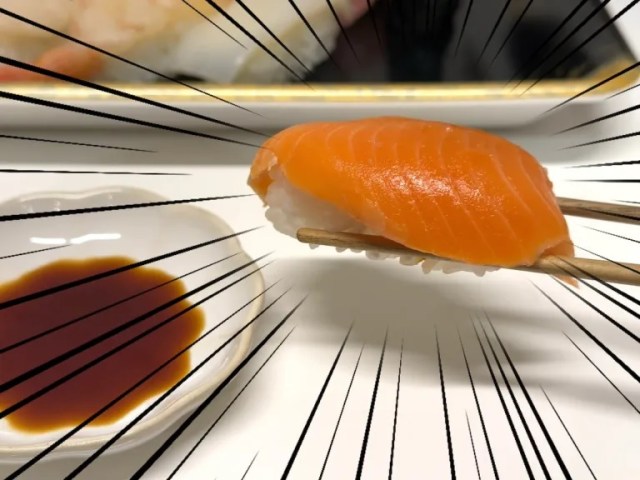
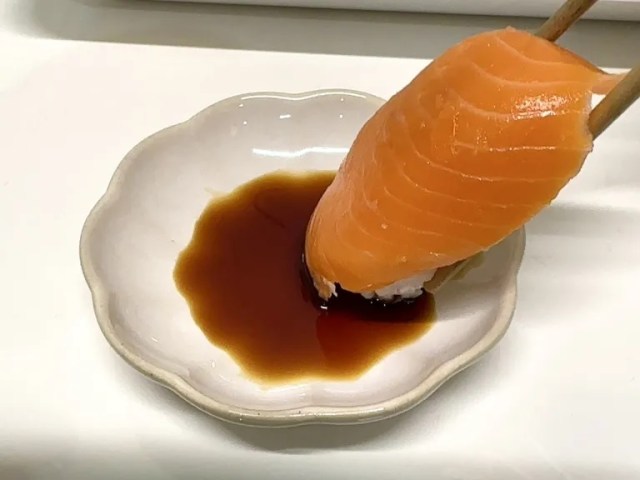
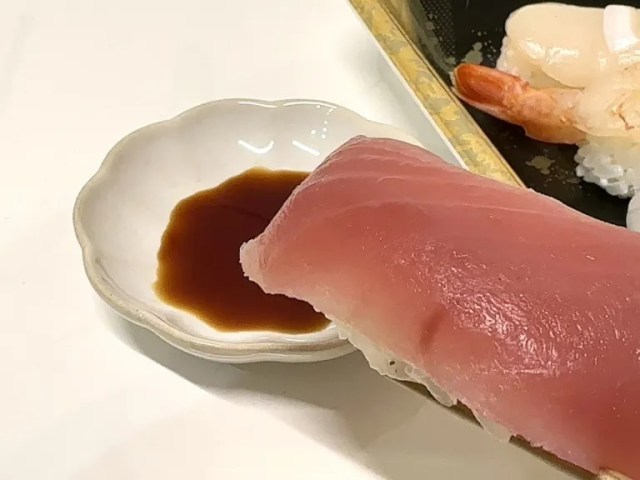
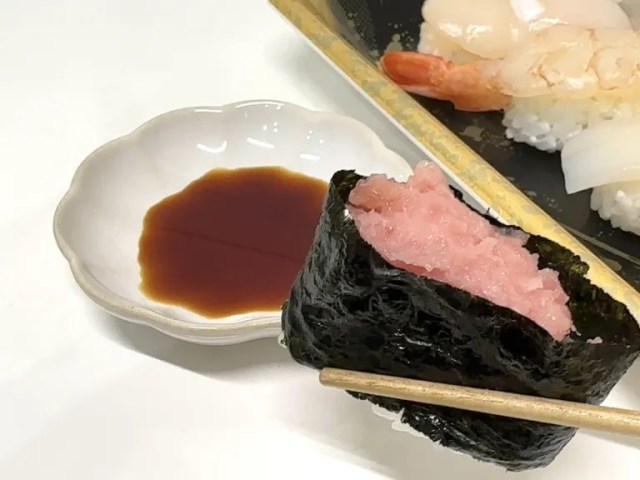
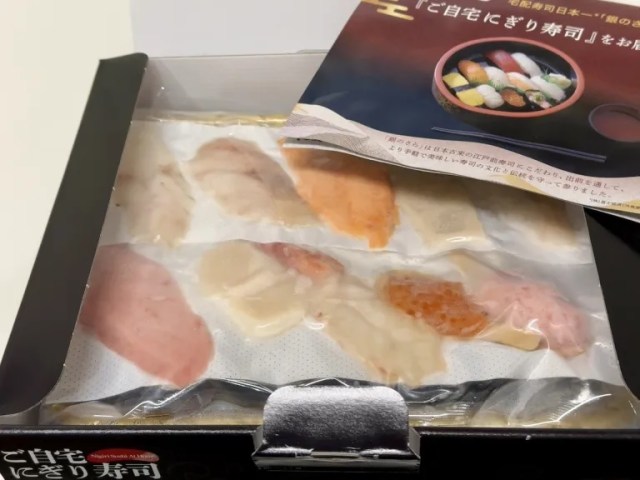
 Frozen sushi appears in Japan, but is it any good?
Frozen sushi appears in Japan, but is it any good? The good, the bad, and the ugly of a vending machine sushi meal in Tokyo【Taste test】
The good, the bad, and the ugly of a vending machine sushi meal in Tokyo【Taste test】 The crazy ordeal of putting together Japan’s 366-piece sushi plastic model kit【Photos】
The crazy ordeal of putting together Japan’s 366-piece sushi plastic model kit【Photos】 Who’s got the best, cheapest one-person sushi delivery in downtown Tokyo? Mr. Sato investigates!
Who’s got the best, cheapest one-person sushi delivery in downtown Tokyo? Mr. Sato investigates! Which is the real piece of sushi, and which is Japan’s insane 429-piece plastic model sushi kit?
Which is the real piece of sushi, and which is Japan’s insane 429-piece plastic model sushi kit? Japan Extreme Budget Travel! A trip from Tokyo to Izumo for just 30,000 yen [Part 1]
Japan Extreme Budget Travel! A trip from Tokyo to Izumo for just 30,000 yen [Part 1] Japanese drugstore sells onigiri at pre-stupid era prices, but how do they compare to 7-Eleven?
Japanese drugstore sells onigiri at pre-stupid era prices, but how do they compare to 7-Eleven? Japan’s new “Cunte” contact lenses aren’t pronounced like you’re probably thinking they are
Japan’s new “Cunte” contact lenses aren’t pronounced like you’re probably thinking they are Skyscraper sized Pokémon cards to appear in Tokyo all year long in Tocho projection mapping event
Skyscraper sized Pokémon cards to appear in Tokyo all year long in Tocho projection mapping event Beautiful website catalogues some of Japan’s most ornate manhole covers
Beautiful website catalogues some of Japan’s most ornate manhole covers Fashion for the young at heart! A different take on what it means to get older in Japan
Fashion for the young at heart! A different take on what it means to get older in Japan 7-Eleven Japan’s sakura sweets season is underway right now!
7-Eleven Japan’s sakura sweets season is underway right now! Starbucks Japan releases first-ever Hinamatsuri Girls’ Day Frappuccino
Starbucks Japan releases first-ever Hinamatsuri Girls’ Day Frappuccino Satisfy your sweet tooth with cheesecake and more all-you-can-eat sweets at Cheese Garden
Satisfy your sweet tooth with cheesecake and more all-you-can-eat sweets at Cheese Garden 10 beautiful packaging designs from Japan
10 beautiful packaging designs from Japan The 10 most annoying things foreign tourists do on Japanese trains, according to locals
The 10 most annoying things foreign tourists do on Japanese trains, according to locals Starbucks Japan releases new sakura goods and drinkware for cherry blossom season 2026
Starbucks Japan releases new sakura goods and drinkware for cherry blossom season 2026 Is Sapporio’s Snow Festival awesome enough to be worth visiting even if you hate the snow? [Pics]
Is Sapporio’s Snow Festival awesome enough to be worth visiting even if you hate the snow? [Pics] Japan has trams that say “sorry” while they ride around town…but why?
Japan has trams that say “sorry” while they ride around town…but why? Tokyo Skytree turns pink for the cherry blossom season
Tokyo Skytree turns pink for the cherry blossom season Highest Starbucks in Japan set to open this spring in the Tokyo sky
Highest Starbucks in Japan set to open this spring in the Tokyo sky Shibuya Station’s Hachiko Gate and Yamanote Line stairway locations change next month
Shibuya Station’s Hachiko Gate and Yamanote Line stairway locations change next month Yakuzen ramen restaurant in Tokyo is very different to a yakuza ramen restaurant
Yakuzen ramen restaurant in Tokyo is very different to a yakuza ramen restaurant Starbucks Japan adds new sakura Frappuccino and cherry blossom drinks to the menu
Starbucks Japan adds new sakura Frappuccino and cherry blossom drinks to the menu Japan’s newest Shinkansen has no seats…or passengers [Video]
Japan’s newest Shinkansen has no seats…or passengers [Video] Foreigners accounting for over 80 percent of off-course skiers needing rescue in Japan’s Hokkaido
Foreigners accounting for over 80 percent of off-course skiers needing rescue in Japan’s Hokkaido Super-salty pizza sends six kids to the hospital in Japan, linguistics blamed
Super-salty pizza sends six kids to the hospital in Japan, linguistics blamed Starbucks Japan unveils new sakura Frappuccino for cherry blossom season 2026
Starbucks Japan unveils new sakura Frappuccino for cherry blossom season 2026 Foreign tourists in Japan will get free Shinkansen tickets to promote regional tourism
Foreign tourists in Japan will get free Shinkansen tickets to promote regional tourism Take a trip to Japan’s Dododo Land, the most irritating place on Earth
Take a trip to Japan’s Dododo Land, the most irritating place on Earth Naruto and Converse team up for new line of shinobi sneakers[Photos]
Naruto and Converse team up for new line of shinobi sneakers[Photos] Is China’s don’t-go-to-Japan warning affecting the lines at a popular Tokyo gyukatsu restaurant?
Is China’s don’t-go-to-Japan warning affecting the lines at a popular Tokyo gyukatsu restaurant? Survey asks foreign tourists what bothered them in Japan, more than half gave same answer
Survey asks foreign tourists what bothered them in Japan, more than half gave same answer Japan’s human washing machines will go on sale to general public, demos to be held in Tokyo
Japan’s human washing machines will go on sale to general public, demos to be held in Tokyo Starbucks Japan releases new drinkware and goods for Valentine’s Day
Starbucks Japan releases new drinkware and goods for Valentine’s Day We deeply regret going into this tunnel on our walk in the mountains of Japan
We deeply regret going into this tunnel on our walk in the mountains of Japan Studio Ghibli releases Kodama forest spirits from Princess Mononoke to light up your home
Studio Ghibli releases Kodama forest spirits from Princess Mononoke to light up your home Major Japanese hotel chain says reservations via overseas booking sites may not be valid
Major Japanese hotel chain says reservations via overseas booking sites may not be valid Put sesame oil in your coffee? Japanese maker says it’s the best way to start your day【Taste test】
Put sesame oil in your coffee? Japanese maker says it’s the best way to start your day【Taste test】 No more using real katana for tourism activities, Japan’s National Police Agency says
No more using real katana for tourism activities, Japan’s National Police Agency says Electric conveyor belt sushi kit brings the fun of a revolving sushi restaurant into your home
Electric conveyor belt sushi kit brings the fun of a revolving sushi restaurant into your home Which Japanese conveyor belt sushi chain has the best egg sushi?【Taste test】
Which Japanese conveyor belt sushi chain has the best egg sushi?【Taste test】 Using red sushi rice makes a real difference, if it’s paired with the right fish【Taste test】
Using red sushi rice makes a real difference, if it’s paired with the right fish【Taste test】 These beautiful pieces of sushi aren’t actually sushi
These beautiful pieces of sushi aren’t actually sushi Which Japanese conveyor belt sushi chain has the best squid sushi?【Taste test】
Which Japanese conveyor belt sushi chain has the best squid sushi?【Taste test】 Sushi from a vending machine — would you try it? Mr. Sato did
Sushi from a vending machine — would you try it? Mr. Sato did Deep-fried sushi exists in Japan, and here’s where to try it【Taste test】
Deep-fried sushi exists in Japan, and here’s where to try it【Taste test】 Sushi vinegar for your McDonald’s hamburger? We create the Japan dip sandwich【Taste test】
Sushi vinegar for your McDonald’s hamburger? We create the Japan dip sandwich【Taste test】 The Unagyu Burger Kit’s ultra expensive/ultra cheap mixture is here, and it’s time to taste test it
The Unagyu Burger Kit’s ultra expensive/ultra cheap mixture is here, and it’s time to taste test it Which Japanese conveyor belt sushi chain has the best salmon sushi?【Taste test】
Which Japanese conveyor belt sushi chain has the best salmon sushi?【Taste test】 How to choose a great block of sashimi-grade tuna – 66-year maguro master shares his protips
How to choose a great block of sashimi-grade tuna – 66-year maguro master shares his protips We ordered a box of koi-shaped sushi to see if they taste as good as they look 【Taste Test】
We ordered a box of koi-shaped sushi to see if they taste as good as they look 【Taste Test】 Which Japanese conveyor belt sushi chain has the best tuna sushi?【Taste test】
Which Japanese conveyor belt sushi chain has the best tuna sushi?【Taste test】 Which Japanese conveyor belt sushi chain has the best iwashi sardine sushi?【Taste test】
Which Japanese conveyor belt sushi chain has the best iwashi sardine sushi?【Taste test】 Which Japanese conveyor belt sushi chain has the best yellowtail sushi?【Taste test】
Which Japanese conveyor belt sushi chain has the best yellowtail sushi?【Taste test】